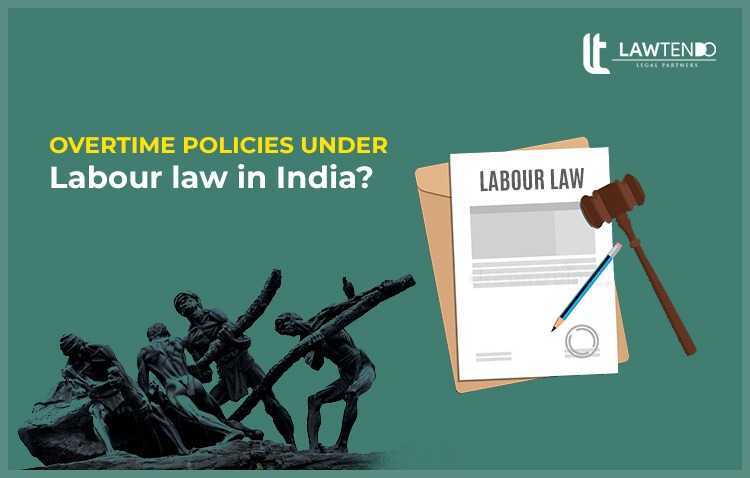What are the overtime policies under labour law in India?

Date : 01 Sep, 2020
Post By Adv. Jash Dalia
This article will educate you about the overtime policy in India, and the provisions relating to it under various legislations. The article will also discuss the overtime laws for women and children. Lastly, the article will tell you how the overtime is calculated, along with some FAQs for a better understanding.
Meaning of Overtime Overtime denotes to the excess time worked to one’s regular working hours. In India, the regular working hours is eight to nine hours per day and forty eight to fifty hours per week. This variation depends upon the establishment where one is employed. If a person works for more than the regular working hours, that person will be eligible to receive extra remuneration for that period, which will be double of the persons’ normal wage. Overtime Laws in India There are several statutes which regulate overtime and overtime payment, and different legal acts and provisions provide for respectively different periods of working hours. However, the standard which is taken is the working hours prescribed under the Factories Act, 1948. AS stated in Section 51 of the Factories Act, employees are not allowed to work for more than 48 hours in one week, and as per section 59, not for more than nine hours in a single day. The time worked in excess to 48 hours in a week and nine hours in a single day will be termed as overtime under the Act, and will require the employer to pay workers twice the standard wage. Provision under Minimum Wages Act, 1948 As per Section 14 of the Act, after an employee is given his or her minimum wage for a fixed period, they have to be paid extra as an overtime rate. Provision under Mines Act, 1952 As per section 33 of the Act, if any mine worker works for more than nine hours above the ground and more than eight hours below it in a day or works for more than 48 hours in a week anywhere, whether above or below, he or she is entitled to be paid twice the ordinary wage for the extra time that was worked. Also, the act does not allow anyone to work for more than ten hours in a day, inclusive of overtime under Section 36. Provision under the Bidi and Cigar Workers (Conditions of Employment) Act, 1966 Under section 17 and 18 of the Act states that, no one is to work for more than ten hours a day and fifty-four hours a week, including overtime. Provision under the Plantation Labour Act, 1951 Provision under this Act states that, if one works for more than the normal number of hours, he or she is to get overtime wages. Overtime Laws for Women and Children The Factories Act, 1948 restricts the employment of women between 7:00 pm and 6:00 am, which can be relaxed by the Chief Inspector of factories in certain cases. If such a relaxation of stipulated working hours exceeds the normal period of working hours, employees will be eligible for overtime compensation. Even then, this relaxation is still time sensitive, that is, women cannot be required to work between 10:00 pm to 05:00 am. Under the same Act, Section 75 specifies that no child below 14 years of age can be employed in any factory. A child above fourteen who is eligible to work in a factory cannot be allowed to work for more than four and a half hours in a day and cannot work between 10:00 pm and 6:00am. In addition, a female child is not allowed to work in any factory, except between 8:00 am and 7:00 pm. How overtime is calculated in India? The Indian employment laws and Indian labour laws are still not complete when it comes to overtime rules in the private sectors in India. The employees in the private sector are often does extra working hours with no or very less remuneration for the overtime work done. In the private sector, the working hours and timings are stipulated by the employer in the company’s HR policies , drafted in accordance with the overtime rules and procedures in India. The company's overtime policy must clearly state the reporting time and working hours for all employees along with provisions relating to leaves and holidays. The HR policy must also include the company’s policy about any remuneration for the extra time any employee works. It becomes important for an employer to get the company overtime policy and employment agreement drafted for overtime calculation in India. You need to have a good employment lawyer to avoid any unnecessary disputes over overtime provisions and laws. The author of this blog is Adv. Jash Dalia having an experience of 3+ years in handling Employment related matters from her experience he wants to share this beneficial information for the individuals having any issues with respect to Employment related matters .






M Paul